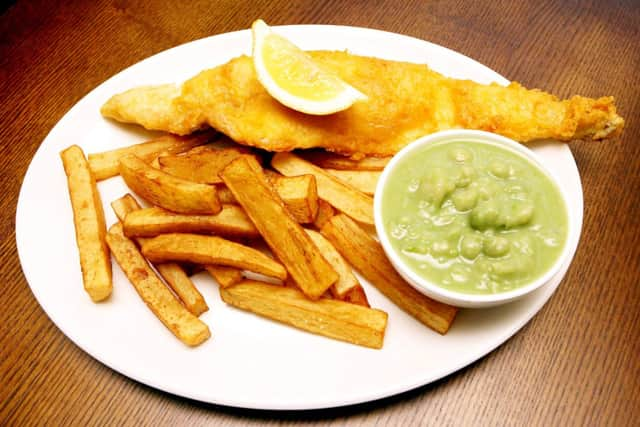These are the top 50 British exports


The top things to come out of Britain have been named as fish and chips, roast dinners – and David Attenborough.
A survey of 2,000 adults found the full English breakfast, the internet and Cadbury chocolate also finished high in the top 50 best British exports, alongside Cheddar cheese and William Shakespeare.
The Beatles and Queen completed the top 10.
Advertisement
Hide AdAdvertisement
Hide AdSeveral traditional British foods made their way into the top 50, with the sandwich, afternoon tea, crumpets and Marmite all ranking highly.
Classic British TV shows Top Gear, Downton Abbey and Doctor Who were also popular, as were public figures such as the Royal Family, Sir Stephen Hawking and David Bowie.
A host of British businesses also appeared in the list, including Marks & Spencer (M&S), Yorkshire Tea and Dyson, alongside car brands MINI, Rolls-Royce and Aston Martin.
British pride
It also emerged that 82 per cent of Brits, polled by Santander UK, think some of the best things in the world have originated in Britain.
Advertisement
Hide AdAdvertisement
Hide AdAnd 79 per cent would like to see more British companies becoming successful overseas, with 85 per cent believing exports to be crucial to the future of the UK economy.
Santander UK head of international and transactional banking, John Carroll, said: “Britain has produced a wealth of successful exports over the years – from classic foods and businesses to TV shows and celebrities.
“As well as being a source of pride, putting us on the global map, UK exports play a significant role in the day-to-day success of British companies and their contribution to the economy back home.
“It’s important that we encourage and support more of our homegrown businesses to trade beyond the UK so we can grow this already impressive list of exports and help British businesses expand and flourish.”
Advertisement
Hide AdAdvertisement
Hide AdThe study also polled 1,000 UK business owners and decision makers and found 48 per cent currently trade internationally, with 86 per cent of these companies reporting that overseas exports are critical to their business.
To boost their chance of success overseas, UK businesses increased their social media presence (30 per cent), advertised differently (29 per cent) or changed their pricing structure (29 per cent).
Others offered more products and services (29 per cent) or hired local staff (28 per cent).
The most common challenges they have encountered trading internationally are extra costs (31 per cent), shipping and transport costs (30 per cent) and language barriers (30 per cent).
Advertisement
Hide AdAdvertisement
Hide AdAnd 29 per cent have struggled to understand the rules and regulations involved.


Appetite for international trade
It also emerged that of those which don’t currently trade internationally, 41 per cent would like to in future.
However, two thirds of those (68 per cent) don’t currently have a plan in place to make this a reality.
John Carroll, from Santander UK, added: “It’s clear from the research that international trade can play a crucial role in helping businesses to emerge from the pandemic and get back to growth and with the right support and partners, these internationally trading businesses can thrive.”
Advertisement
Hide AdAdvertisement
Hide Ad“Later this year, we will be launching a new online platform, where we will share our years of experience and knowledge in one place to help businesses with tailored support to find their way when expanding overseas.
“We’re here to help these businesses with support that goes beyond banking as they navigate the challenges.”
The UK business owners and decision makers also revealed their top tips for international trade success, including ensuring there is a market for your product (30 per cent) and making sure your UK business is thriving first (27 per cent).
Other tips include investing in market intelligence in the area you want to trade in (23 per cent), having a 'Plan B' (21 per cent) and hiring employees who speak the language of the countries you want to trade in (20 per cent).
Advertisement
Hide AdAdvertisement
Hide AdInclusive clothing e-retailer Snag Group is a Scotland-based company that has made a real success of trading internationally – half of its sales come from overseas.
With the support of Santander UK, it has acquired a new warehouse to help meet growing demand.
Its founder and CEO, Brie Read, said: “My advice to UK companies considering taking their business international is that it may seem like a mammoth task but there’s so much fantastic help available to support you.
“Lots of research and an ‘all-hands-on deck’ approach are necessary, but it’s well worth knowing that your customers are benefiting.”
Advertisement
Hide AdAdvertisement
Hide AdThe study, carried out via OnePoll, also found 58 per cent of business owners believe the ‘future is bright’ for British businesses operating internationally.
Of those, 45 per cent think the freedom from EU regulation will improve things, while 44 per cent put their optimism down to consumers wanting to support British businesses more.
Top 50 British exports
1. Fish and chips
2. Roast dinners
3. Sir David Attenborough
4. Full English breakfast
5. The internet
6. Cadbury chocolate
7. Cheddar Cheese
8. William Shakespeare
9. The Beatles
10. Queen
11. James Bond
12. BBC
13. The sandwich
14. Sir Stephen Hawking
15. Afternoon tea
16. The Royal Family
17. Marks & Spencer (M&S)
18. Rolls-Royce cars
19. Sherlock Holmes
20. David Bowie
21. Aston Martin car
22. Digestive biscuits
23. Yorkshire Tea
24. Crumpets
25. Monty Python
26. Kit Kat
27. MINI cars
28. The pasty
29. Dyson vacuum cleaners
30. Sir Elton John
31. Rolling Stones
32. Doctor Who
33. Land Rover cars
34. Marmite
35. Bentley cars
36. Ed Sheeran
37. Tetley tea
38. Sir Charlie Chaplin
39. Dr Martens shoes
40. Adele
41. Dame Helen Mirren
42. Downton Abbey
43. George Michael
44. Stan Laurel
45. Triumph Motorcycles Ltd
46. Twinings tea
47. Sir Andy Murray
48. Henry the Vacuum Cleaner
49. Top Gear
50. Spice Girls